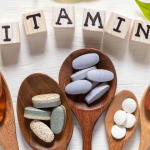
What happens if you take Berberine for 30 days
April 23, 2025
5 Vitamins that Boost Brain Power
June 8, 2025Want to boost your brainpower and sharpen your focus? Eating the right foods can make a real difference.
If you’re tired of brain fog or just want to enhance your mental performance, you’re in the right place. Adding specific nutrient-rich foods to your diet can lead to significant improvements in your cognitive abilities.
Now, let’s dive into 5 amazing brain-boosting foods you should be eating regularly.
1. Fatty Fish
When we talk about brain foods, fatty fish like salmon, mackerel, trout, and sardines are consistently at the top of the list. And for good reason.
Fatty fish are packed with omega 3 fatty acids, particularly DHA, docosahexaenoic acid.
About 60% of your brain is made of fat, and half of that fat is the omega 3 type, primarily DHA.
Your brain uses DHA to build brain and nerve cells, and these fats are essential for learning and memory.
Omega-3s also have anti-inflammatory effects and can protect against age-related cognitive decline.
A study of 260 cognitively normal individuals found that weekly consumption of baked or broiled fish was positively associated with larger gray matter volumes in key brain areas involved in memory and cognition. This suggests that dietary fish intake is related to better brain structural integrity.
To incorporate Fatty Fish in your diet, aim for at least two servings of fatty fish per week. Grilled salmon for dinner, a mackerel salad for lunch, or even sardines on toast for a quick snack are great options. If you’re not a fan of fish, consider an omega 3 supplement.
By the way, if you are interested in Boosting your brain with proper nutrition and supplementation, check out our 12-week brain boost system.
2. Blueberries
Don’t let their small size fool you, blueberries are a potent brain food.
Blueberries are loaded with antioxidants, particularly flavonoids like anthocyanins, which give them their characteristic blue color.
These antioxidants combat oxidative stress and inflammation, both of which can contribute to brain aging and neurodegenerative diseases.
Some of the antioxidants in blueberries have been found to accumulate in the brain and help improve communication between brain cells.
A systematic review analyzing 12 studies found that blueberry consumption was often linked to improved cognitive performance, especially for short and long-term memory, in children and adults. This suggests that blueberries will be a beneficial food for supporting cognitive functions like memory.
To incorporate Blueberries in your diet, add a handful of fresh or frozen blueberries to your morning oatmeal, yogurt, or smoothies. They also make a great standalone snack.
3. Turmeric (and Curcumin)
This golden spice, a staple in curry, has been gaining massive attention for its brain health benefits, primarily due to its active compound, curcumin.
Curcumin is a powerful anti-inflammatory agent and antioxidant. It can cross the blood-brain barrier, meaning it can directly enter the brain and benefit the cells there.
Curcumin has been shown to boost levels of Brain-Derived Neurotrophic Factor (BDNF), a growth hormone that helps brain cells grow, and it may help improve memory and delay age-related cognitive decline.
It’s also being studied for its potential role in clearing amyloid plaques, which are a hallmark of Alzheimer’s disease.
A systematic review of 12 studies found that curcumin supplementation significantly improved working memory in diverse groups of adults, including those with and without cognitive impairments.
To incorporate Turmeric in your diet add turmeric to curries, soups, stews, or even sprinkle it on roasted vegetables. You can also make golden milk, a warm drink with milk, turmeric, and other spices. For better absorption, combine turmeric with a pinch of black pepper.
4. Broccoli
Broccoli is a nutritional powerhouses for your brain.
Broccoli is packed with potent plant compounds, including sulforaphane, which has antioxidant and anti-inflammatory effects. It’s also very high in vitamin K, a fat-soluble vitamin that is essential for forming sphingolipids, a type of fat that’s densely packed into brain cells.
Several studies in older adults have linked a higher vitamin K intake to better memory and cognitive status.
Beyond vitamin K, the antioxidants in broccoli help protect the brain against damage from free radicals, potentially reducing the risk of neurodegenerative conditions.
A 12-week randomized controlled trial involving 144 healthy older adults found that daily sulforaphane supplementation improved cognitive processing speed and reduced negative mood compared to a placebo. This suggests that sulforaphane, a compound found in foods like broccoli, may positively affect specific cognitive functions and mood in aging, even without combined cognitive training.
To incorporate Broccoli in your diet, Steam, roast, or stir-fry broccoli as a side dish. Add it to salads, pasta dishes, or omelets. Don’t overcook it to retain its nutrients.
5. Dark Chocolate
Good news for chocolate lovers! Dark chocolate, specifically the kind with high cocoa content, 70% or more, can be beneficial for your brain.
Dark chocolate and cocoa powder are rich in flavonoids, caffeine, and antioxidants. The flavonoids in chocolate gather in the areas of the brain that deal with learning and memory.
Researchers suggest these compounds may enhance memory and also help slow down age-related mental decline.
The caffeine and theobromine in dark chocolate can provide a short-term boost in mental alertness and cognitive function.
A study involving 18 middle-aged adults found that consuming dark chocolate with a high concentration of polyphenols helped maintain accuracy and concentration during demanding cognitive tasks, whereas performance declined with low-polyphenol chocolate. This suggests that polyphenol-rich dark chocolate may help sustain cognitive function and focus when facing challenging mental activities.
To incorporate Dark Chocolate in your diet, enjoy a small square (about 1 ounce) of dark chocolate with at least 70% cocoa content as a treat. You can also add unsweetened cocoa powder to your coffee or smoothies for a flavonoid boost without too much sugar.
